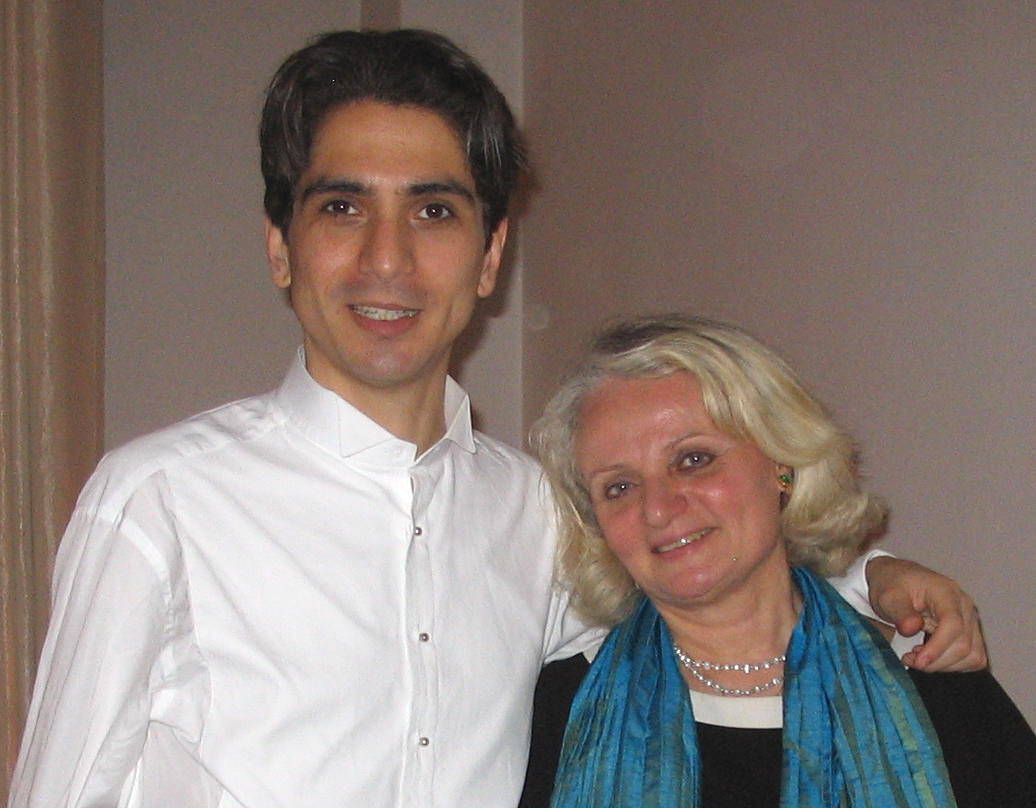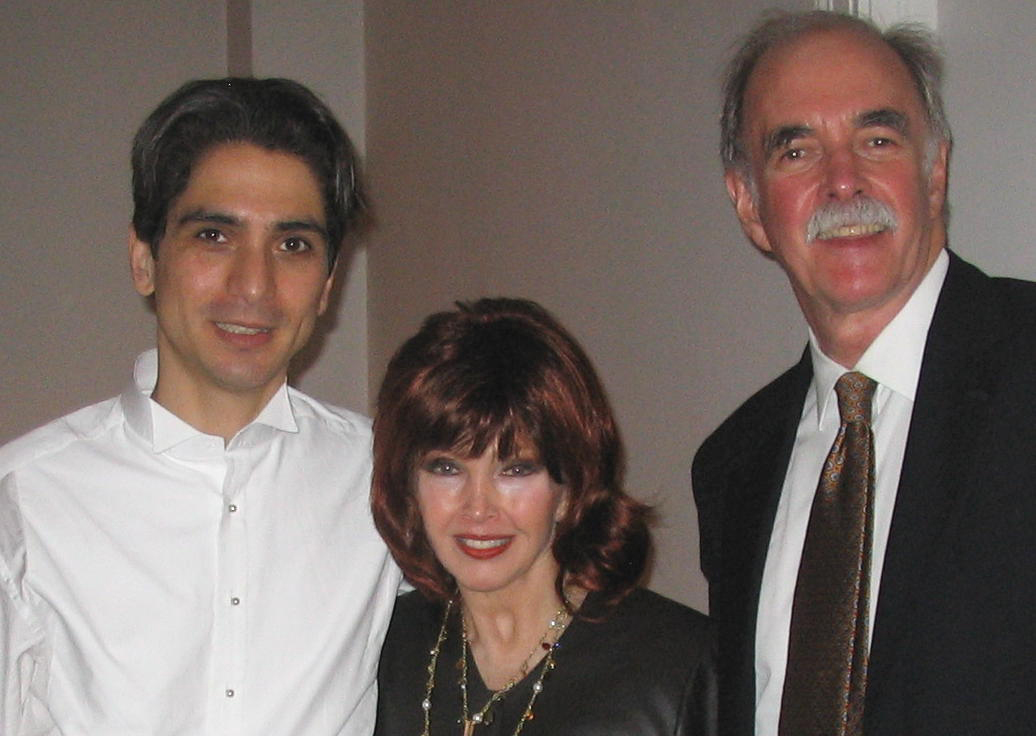 |
 |
||
| Cheryl North :: Interviews | |||
Cheryl North Interviews Alexandros KapelisANG Newspapers Classical Music Column from March 16, 2007, under title: Greek Pianist Builds Career of Mythic Proportions Alexandros Kapelis' life sounds about as close to an ancient Greek myth as one can get in the 21st century. At age 30, the dark-eyed, smolderingly handsome pianist, who looks a bit like a young Al Pacino in the first of the Godfather movies, will make his Bay Area recital debut at 8 p.m. Tuesday at Herbst Theatre in San Francisco. His recital, billed as "The Greek Myth and the Piano," is one of several special events for Greek National Day, sponsored by the Greek Consulate General with support from the Department of Culture of the Hellenic Ministry of Foreign Affairs and the Gina Bachauer Memorial Foundation of Greece.
 Alexandros Kapelis with Mrs. Xenia Stephanidou, the Honorable Consul General of Greece in San Francisco, March 20, 2007
"I did not choose to be a musician," the congenial Kapelis said during a telephone interview last week. "Music chose me. The awe I've always felt when I hear music — the monumentality of music; it was as though the choice was made for me." Such words sounded to me very much like they came straight from the tales of the ancient Greek Fates, or Moirae, who were described in Greek poetry, myth and drama as the goddesses who controlled the destiny of everyone from birth to death. All living things, even the gods themselves, were thought to be subject to the decrees of the Fates. "We had an old upright piano at home," Kapelis said. "When I was about 4, I remember listening to a soundtrack from a television show. It was in E-flat minor. I rushed to the piano and began to play along with it. The other people in the room thought it was 'cute' and urged my mother to give me piano lessons. It turned out that I had perfect pitch, which is very rare, and was quite unexpected, since no one else in my family was particularly musical." He took to his early piano lessons like a seaworthy ship takes to water. By the time he was in his teens, he had his first serious love affair: The object of his absorbing affection was none other than the great 18th-century German composer, Johann Sebastian Bach. "I remember that, while we were living in Lima (Peru), our classical radio station broadcast two hours of the music of J.S. Bach every Saturday night. I listened faithfully to every broadcast for three years, until I had heard every recorded work written by Bach. By that time I had transcribed and could play the Bach Orchestral Suites by ear on the piano. "I really had NO choice, but to go into music," he said. "It's absolutely not an ego thing. When you perform, you must lose yourself — your ego — in the music. You must become an instrument to bring a communion of truth from the composer to the audience. I as a person, become absolutely irrelevant in the equation." Tracing his background, he explained that his father was Greek and his mother Peruvian. His father, as a young man in Greece, developed a yen for travel and set off to see South America. While in Peru, he met and married Alexandros' mother, and the two had three children. Alexandros is the youngest. His older sister is fluent in four languages and works as a translator for the French ambassador in Peru. His older brother is head of Nike in South America. The young family was subject to the father's wanderlust, and when the elder Kapelis' homesickness for Greece became unbearable, they all picked up and headed to Papa's homeland. This meant that the children had the advantage of growing up in two cultures. They formed new friends and Alexandros continued his piano study. Besides intense study in Greece, he continued his studies in London and, eventually, at New York's Mannes College of Music, where he was tutored by Diane Walsh and Julius Levine. He also has studied conducting with Bruno Aprea at the Accademia Internazionale delle Arti in Rome and Gianluigi Gelmetti at the Accademia Chigiana in Siena. During the last few years, he has performed as soloist with the Prague Symphony Orchestra and Mexico's Monterrey Symphony, and he recently made his debut with the Royal Philharmonic Orchestra in London. He also has debuted at Lincoln Center, the United Nations, London's Cadogan Hall, the Salle Cortot in Paris, the Chicago Institute, the Musei Capitolini in Rome, the Athens Megaron and many other choice venues. His main home is now New York City, where he enjoys yoga, bicycling ("all over NYC," he says), horseback-riding, traveling and reading. In fact, he is a voracious reader. He said that the genesis of his Greek myth-themed recital was a New York City exhibition of 86 paintings based on Homeric legends and Greek myths. He was asked to put together and perform a recital of piano works inspired by various Greek myths. In the recital's program notes, he writes, "Greek myth, with its superb philosophical explorations, has exercised an inescapable force on the creative minds in all eras. The visual arts and literature have been the most vulnerable to their universal appeal and transcendence, while opera, since its inception, has been dominated by the power of its heroic and tragic figures." He writes well, too. His local debut program will begin with Muzio Clementi's Op. 50 Sonata No. 3 in G minor, which was inspired by the ill-fated affair of the Trojan Prince Aeneas with Queen Dido of Crete. Clementi's subtitle for the Sonata is "Dido Abandoned: Tragic Scene." Other programmed works will be Kalomiris' Sia ta Ellinopoula; Debussy's Danseuses de Delphes and L'Isle Joyeuse from his Preludes, Book I; Rameau's L'Entretien des Muses; Les Tourbillons; and Les Cyclopes; Constantinidis' Eight Dances from the Greek Isles; and a special bonus — Rachmaninoff's glorious Op. 33 Etudes-Tableaux. While I'm not sure about the Greek connection of Rachmaninoff's Etudes, I can certainly testify to their seductively mesmerizing powers.
 Alexandros Kapelis with Cheryl and Warner North at a reception follwing his concert on March 20, 2007 |